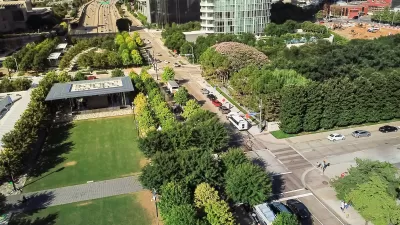As plans progress in many large cities to cap their below-grade urban freeways, smaller cities, like Ventura, California, are looking to benefit from similar proposals.
In an effort to heal the wounds inflicted on their urban fabric and historic neighborhoods by highway projects of the last century, several cities in Southern California are exploring the possibility of covering their below-grade freeways with parks and redevelopment. The latest city to jump on the bandwagon is Ventura, located 65 miles northwest of Los Angeles.
Funded by a grant from the regional metropolitan planning organization, the Southern California Association of Governments (SCAG), a design team has proposed capping a two to three block stretch of U.S. 101 through the Ventura's highly-visited downtown. As Arlene Martinez of the Ventura County Star reports, the newly available land on top of the freeway cap could possibly contain "...a conference center, a transportation hub for trains and buses, and a mix of retail and commercial uses..." Tentatively priced at $400 million, the proposal is still very much a "concept," with the exact price contingent upon various other factors.
"To be able to reorganize and restore the urban fabric that we used to have would be unbelievably huge to the city in so many ways I can't even count them," said Bill Fulton, the former Ventura mayor who now is vice president of Smart Growth America, a Washington, D.C., urban planning think tank. "The question is, if we can pull that off."
The cap in Ventura echoes similar efforts in Southern California to cap the 101 Freeway, such as the much larger mile-long Hollywood Central Park and half-mile downtown L.A. cap, estimated to cost $1 billion and $700 million, respectively.
FULL STORY: Freeway 'cap' could reunite downtown with the ocean

Planetizen Federal Action Tracker
A weekly monitor of how Trump’s orders and actions are impacting planners and planning in America.

Map: Where Senate Republicans Want to Sell Your Public Lands
For public land advocates, the Senate Republicans’ proposal to sell millions of acres of public land in the West is “the biggest fight of their careers.”

Restaurant Patios Were a Pandemic Win — Why Were They so Hard to Keep?
Social distancing requirements and changes in travel patterns prompted cities to pilot new uses for street and sidewalk space. Then it got complicated.

Maui's Vacation Rental Debate Turns Ugly
Verbal attacks, misinformation campaigns and fistfights plague a high-stakes debate to convert thousands of vacation rentals into long-term housing.

San Francisco Suspends Traffic Calming Amidst Record Deaths
Citing “a challenging fiscal landscape,” the city will cease the program on the heels of 42 traffic deaths, including 24 pedestrians.

California Homeless Arrests, Citations Spike After Ruling
An investigation reveals that anti-homeless actions increased up to 500% after Grants Pass v. Johnson — even in cities claiming no policy change.
Urban Design for Planners 1: Software Tools
This six-course series explores essential urban design concepts using open source software and equips planners with the tools they need to participate fully in the urban design process.
Planning for Universal Design
Learn the tools for implementing Universal Design in planning regulations.
Heyer Gruel & Associates PA
JM Goldson LLC
Custer County Colorado
City of Camden Redevelopment Agency
City of Astoria
Transportation Research & Education Center (TREC) at Portland State University
Camden Redevelopment Agency
City of Claremont
Municipality of Princeton (NJ)




























